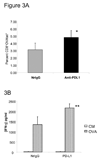Blockade of programmed death ligand 1 enhances the therapeutic efficacy of combination immunotherapy against melanoma
- PMID: 20194714
- PMCID: PMC2913584
- DOI: 10.4049/jimmunol.0904114
Blockade of programmed death ligand 1 enhances the therapeutic efficacy of combination immunotherapy against melanoma
Abstract
Inhibition of antitumor T cell responses can be mediated by the productive interaction between the programmed death-1 (PD-1) receptor on T cells and its ligand PD-L1. PD-L1 is highly expressed on both murine bone marrow-derived dendritic cells (DCs) and B16 melanoma. In this study, in vitro blockade of PD-L1 interaction on DCs led to enhanced IFN-gamma production and cytotoxicity by Ag-specific T cells. In vivo, the systemic administration of anti-PD-L1 Ab plus melanoma peptide-pulsed DCs resulted in a higher number of melanoma peptide-specific CD8(+) T cells, but this combination was insufficient to delay the growth of established B16 melanoma. Although the addition of 600 rad of total body irradiation delayed tumor growth, further adoptive transfer of Ag-specific CD8(+) T cells was needed to achieve tumor regression and long-term survival of the treated mice. Lymphopenic mice treated with anti-PD-L1 Ab demonstrated increased activation and persistence of adoptively transferred T cells, including a higher number of CD8(+) T cells infiltrating the tumor mass. Together, these studies support the blocking of PD-L1 signaling as a means to enhance combined immunotherapy approaches against melanoma.
Figures








References
-
- Nestle FO, Alijagic S, Gilliet M, Sun Y, Grabbe S, Dummer R, Burg G, Schadendorf D. Vaccination of melanoma patients with peptide- or tumor lysate-pulsed dendritic cells. Nature medicine. 1998;4:328–332. - PubMed
-
- Chang AE, Redman BG, Whitfield JR, Nickoloff BJ, Braun TM, Lee PP, Geiger JD, Mulé JJ. A phase I trial of tumor lysate-pulsed dendritic cells in the treatment of advanced cancer. Clin Cancer Res. 2002;8:1021–1032. - PubMed
-
- Dong H, Strome SE, Salomao DR, Tamura H, Hirano F, Flies DB, Roche PC, Lu J, Zhu G, Tamada K, Lennon VA, Celis E, Chen L. Tumor-associated B7-H1 promotes T-cell apoptosis: a potential mechanism of immune evasion. Nature medicine. 2002;8:793–800. - PubMed
Publication types
MeSH terms
Substances
Grants and funding
LinkOut - more resources
Full Text Sources
Other Literature Sources
Medical
Research Materials

